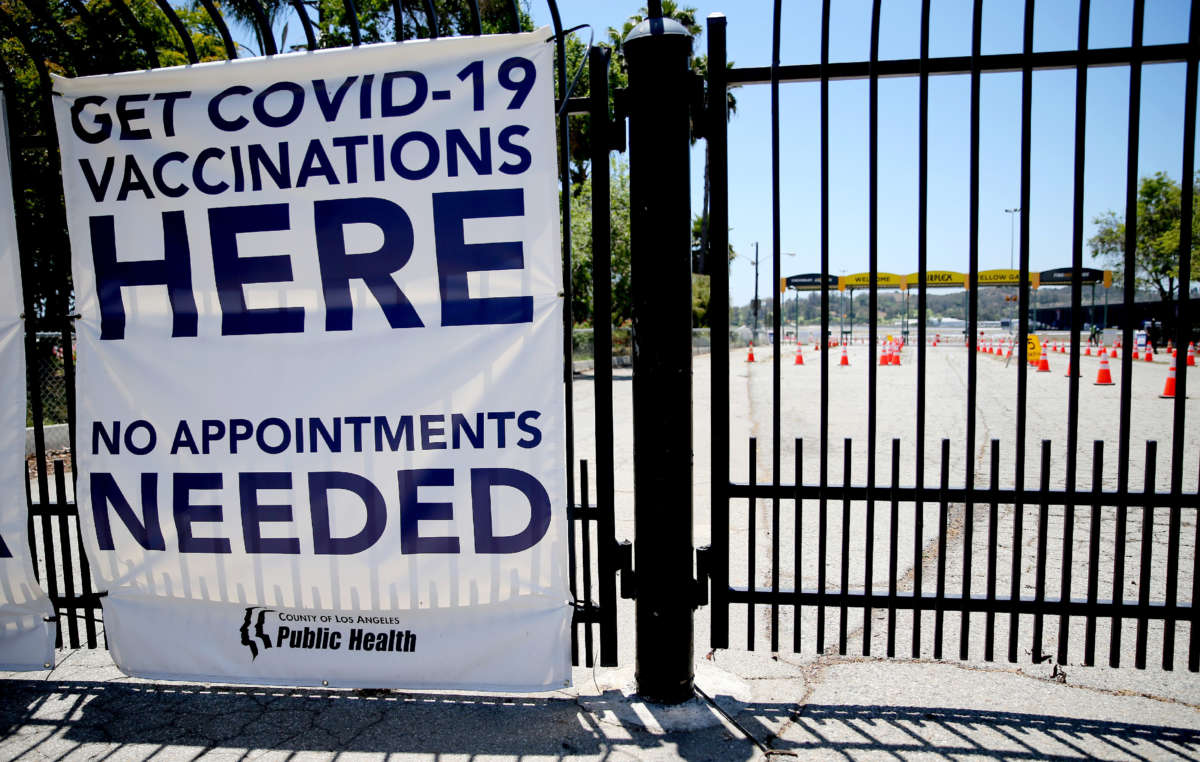New Census Bureau data shows that the majority of the adults in the U.S. who haven’t received a COVID-19 vaccine live in households that make less than $50,000 a year.
Axios reports that, according to a June survey of adults in the U.S., about 52.7 percent of Americans who have yet to be vaccinated live in households making $50,000 a year or less. People living in households making less than $25,000 annually make up the largest portion of the unvaccinated people surveyed at 22 percent.
About 67 percent of U.S. adults have received at least one shot of a COVID vaccine, according to the New York Times’s vaccine tracker. The country recently fell short of President Joe Biden’s vaccination goal of 70 percent of adults with at least one jab by July 4. Vaccination rates have been slowing over the past couple of months even as vaccine appointments have become more available.
Though Republicans have highly politicized and spread conspiracies about the vaccine, the Census data appears to show that a significant reason for the slowdown could be over issues of access. About two-thirds of the people surveyed in households making less than $50,000 a year said they would “definitely” or “probably” get the vaccine.
The decision of whether or not to get vaccinated, then, seems to be a choice that not everyone can make freely or without consequences. Experts say that the reason why many people who are lower-income or are otherwise marginalized may not have gotten vaccinated may be due to a variety of labor and social issues barring them from accessing a vaccine.
Many unvaccinated people fear financial barriers to getting the shot. Some people worry they may get charged for the vaccine, as there have been some reports of people being billed for their shots even though they are supposed to be free to the public.
A common issue barring especially lower-income people from accessing the vaccine is that they may not be able to take off work to get the vaccine or to deal with its side effects. About a quarter of workers in the U.S. don’t get paid sick leave, meaning that the vaccine could cause them to miss out on vital income or risk losing work hours or even their jobs.
Though there is no official ID requirement to get the jab, some people are concerned that they may lack the proper documentation, such as a state-issued ID or Social Security Number, reported Robert R. Raymond for Truthout. This could be barring people without state-issued IDs who are largely poor, young or Black, as well as undocumented people from getting the jab.
Public health experts say that initiatives like clarifying issues around IDs and billing and offering “after hours” shots for those who can’t take time off work are vital to boosting vaccination rates, reports Raymond.
Also vital, however, is to address the root cause of these labor issues, which the pandemic has laid more bare than ever. Before the vaccines came around, COVID was spreading viciously among people in restaurant jobs, for instance — a group of people who often can’t take time off because it would result in them losing the vital income earned in tips.
President Joe Biden had proposed alleviating some of these underlying labor issues with universal paid family and medical leave in his American Families Plan. But he also allowed the entirety of the plan to be cut from recent infrastructure negotiations with Republicans and conservative Democrats.
Meanwhile, even as issues of access are driving slower vaccination rates, another large factor appears to be Republican conspiracy theories and fear mongering about the vaccine. Recent data showed that right wing media, especially the most extremist outlets, appear to be driving many Republicans to choose not to be vaccinated.
Indeed, the right is aligning itself as anti-vaccine. After a speaker at the Conservative Political Action Conference (CPAC) predicted with some satisfaction that the U.S. would not reach its goal of having 90 percent of the population vaccinated, attendees cheered.
Public health officials like Biden’s chief medical advisor on COVID, Anthony Fauci, have said, however, that getting 90 percent vaccinated may be necessary to reach herd immunity. Fauci reacted to the CPAC clip on Sunday on CNN, saying “it’s almost frightening to say, ‘Hey, guess what, we don’t want you to do something to save your life, yay!’ Everybody starts screaming and clapping. I just don’t get that.”
Media that fights fascism
Truthout is funded almost entirely by readers — that’s why we can speak truth to power and cut against the mainstream narrative. But independent journalists at Truthout face mounting political repression under Trump.
We rely on your support to survive McCarthyist censorship. Please make a tax-deductible one-time or monthly donation.
